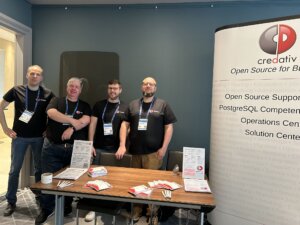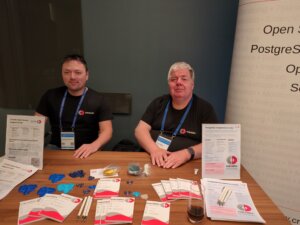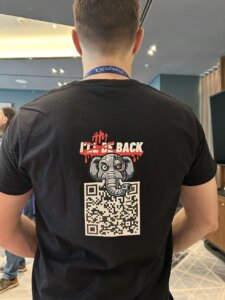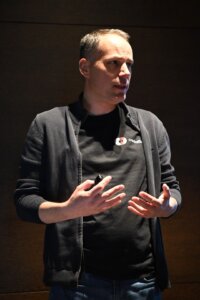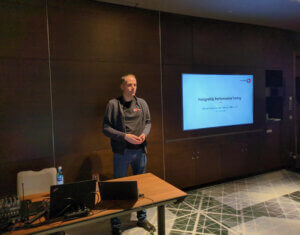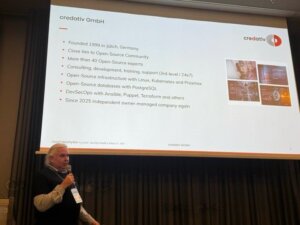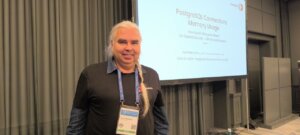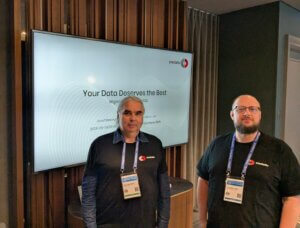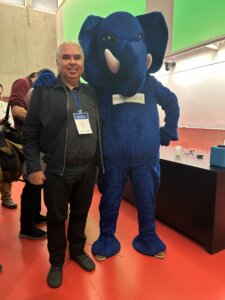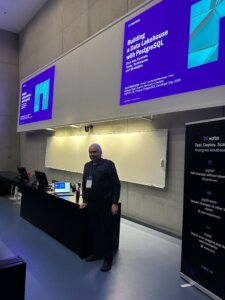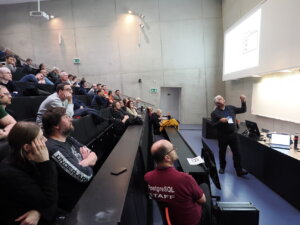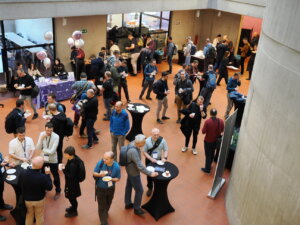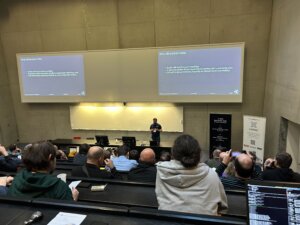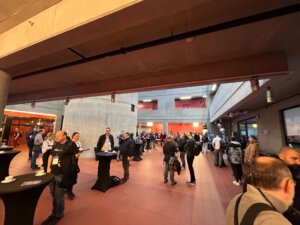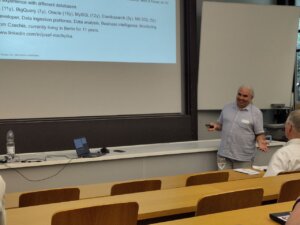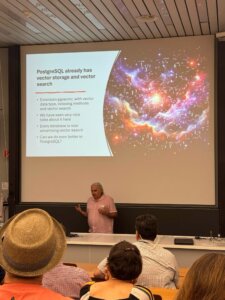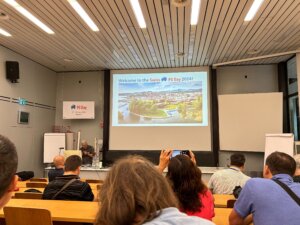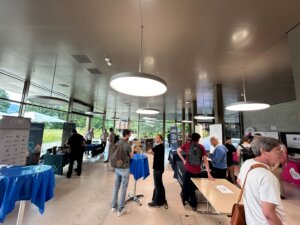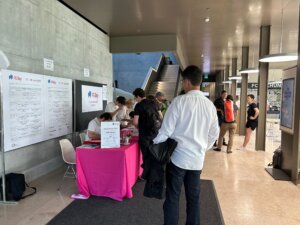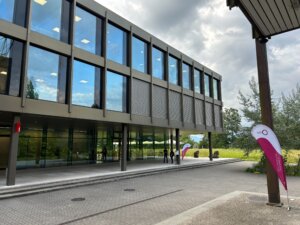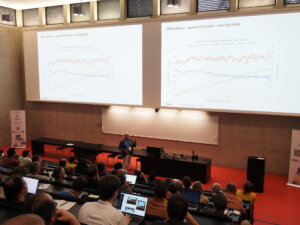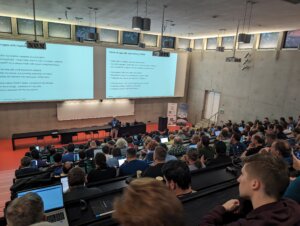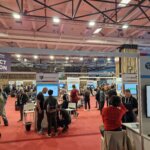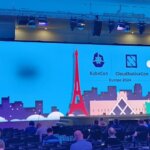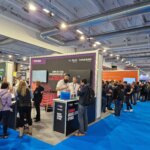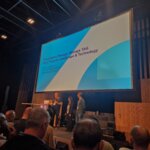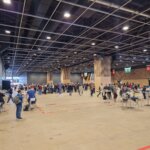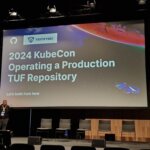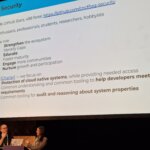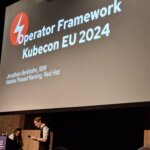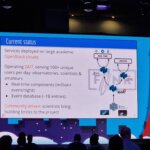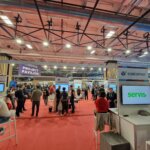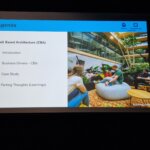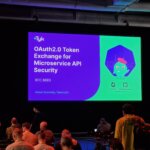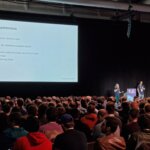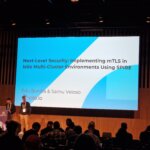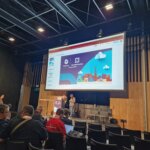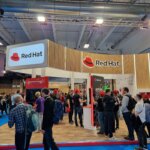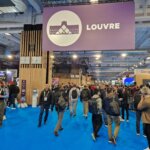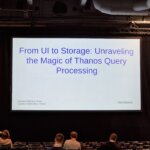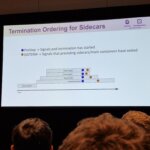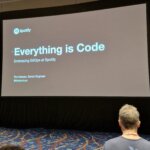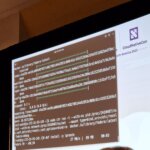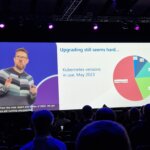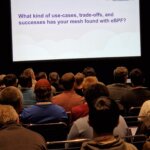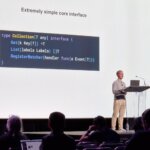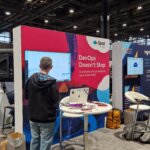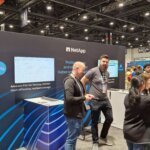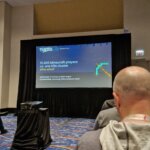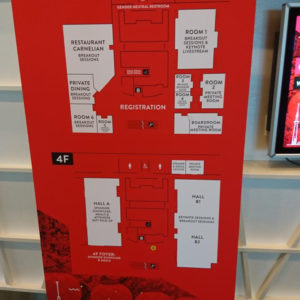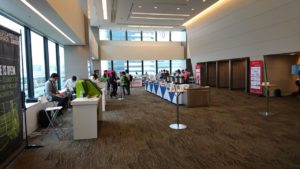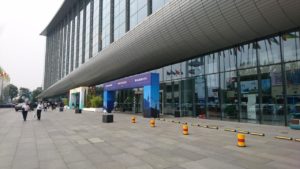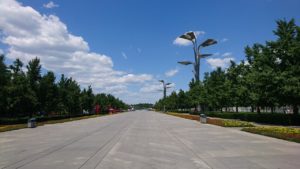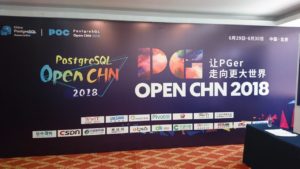PGConf.DE 2025, the 9th Annual PostgreSQL Conference Germany, was held on May 8–9, 2025, at the Marriott Hotel near Potsdamer Platz in Berlin. The event interconnected PostgreSQL enthusiasts, developers, DBAs, and industry sponsors for two days of fascinating talks across four parallel tracks. It was the biggest event so far, with 347 attendees. The whole conference was very well organized, and therefore special thanks are due to all the organizers—in particular Andreas Scherbaum, the main organizer—for their efforts and hard work.
Our company, credativ GmbH, being independent again, participated as a gold sponsor. The credativ CTO Alexander Wirt, Head of Sales & Marketing Peter Dreuw and team leader of Database team Tobias Kauder, were available for attendees at the credativ booth. Many thanks to our team colleague Sascha Spettmann for delivering all the stands and billboards to the conference and back again.
In total, we held four talks at the conference. Michael Banck, technical leader of our database team, presented the German-language talk “PostgreSQL Performance Tuning.” He provided a deep and comprehensive overview of the most important performance-tuning parameters in PostgreSQL and explained how they influence the database’s behavior. His talk attracted a large audience and was very well received.
I had an absolutely unique opportunity to present three different talks in the English track. In my regular talk “PostgreSQL Connections Memory Usage: How Much, Why and When,” I presented the results of my research and tests on PostgreSQL connections’ memory usage. After explaining the most important aspects of Linux memory management and measurements of memory usage reported by standard commands, I detailed PostgreSQL connection memory usage during query execution based on numbers reported in smaps files. I intend to publish detailed blog posts about my findings soon. My other talk, “Building a Data Lakehouse with PostgreSQL,” was originally chosen as a reserve talk in case of a last-minute cancellation. Unfortunately, this indeed happened: the talk “Creating a Board Game Chatbot with Postgres, AI, and RAG” by Matt Cornillon had to be replaced. The speaker could not attend because his flight was unexpectedly canceled at very short notice.
In the sponsor track, credativ CTO Alexander Wirt and I presented a talk titled “Your Data Deserves the Best: Migration to PostgreSQL.” It featured our new migration tool, “credativ-pg-migrator.” It is capable of migrating data models (tables, data, indexes, constraints, and views) from Informix, IBM DB2 LUW, MS SQL Server, Sybase ASE, SQL Anywhere, and MySQL/MariaDB. In the case of Informix, it can also convert stored procedures, functions, and triggers into PostgreSQL PL/pgSQL. We will share more details about this tool in a separate blog post.
Since there were always three or four parallel talks, I had to carefully choose which sessions to attend. I greatly enjoyed the talk “András in Windowsland – a DBA’s (mis)adventures” by András Váczi from Cybertec. The speaker presented many useful tips for accessing and troubleshooting PostgreSQL on Windows. I also enjoyed the German talk “Modern VACUUM,” delivered by Christoph Berg from Cybertec. He provided valuable insights into the history and implementation details of the VACUUM command and autovacuum background processes. Another very interesting talk was the German presentation “Modernes SSL ideal einsetzen” by Peter Eisentraut from EDB. The talk covered selecting appropriate protocol versions and cryptographic cipher suites, managing keys and certificates, and configuring client/server settings to meet contemporary security standards. The talk “Comparing the Oracle and PostgreSQL transaction systems,” delivered by Laurenz Albe from Cybertec, received a lot of well-deserved attention. Key topics included Oracle’s undo/redo mechanism versus PostgreSQL’s MVCC approach, differences in isolation level defaults and anomalies, and how each database implements constraints and transactional DDL. Last but not least, I want to mention the talk “What is an SLRU anyway?” delivered by major PostgreSQL contributor Álvaro Herrera. He explained that SLRUs are essentially circular logs with an in-memory cache used for tracking information such as committed transactions or snapshot data and he highlighted the significance of PostgreSQL 17’s innovations which made SLRU cache sizes configurable. Unfortunately, the talks were not recorded, but slides for the majority of the talks are already available on the conference website.
The whole event was highly informative and provided excellent networking opportunities. We are very much looking forward to participating in the next PGConf.DE. In the meantime, stay tuned to all credativ news, follow us on social media – LinkedIn and Mastodon.
If you are interested in our PostgreSQL related services, click here!
The Prague PostgreSQL Developer Day (P2D2) is a well-established Czech PostgreSQL conference. This year’s 17th edition was exceptional, with 275 registered visitors and 16 talks across two tracks. Notably, several major PostgreSQL contributors and core members were present, underlining the event’s significance. Tomas Vondra, as in previous years, organized the conference. Bruce Momjian, Vice President and Postgres Evangelist at EDB, led a half-day workshop titled “Postgres & AI: From the Trenches to the Sky.” Robert Haas delivered a really interesting talk on Incremental Backup in PostgreSQL 17, a feature he developed.
I had the fantastic opportunity to contribute to this conference with my new talk, “Building a Data Lakehouse with PostgreSQL: Dive into Formats, Tools, Techniques, and Strategies.” Given the still evolving nature of this topic and the varying definitions of data lakehouses, I covered the most important areas, highlighting the functionalities and extensions PostgreSQL offers. I received very positive feedback on my talk and had several insightful discussions about the topic with different people.
Among the talks I attended, I particularly enjoyed Robert Haas’s presentation on Incremental Backups, the practical demonstration of PostgreSQL statistics in the talk “Statistics: How PostgreSQL Counts Without Counting” by Sadeq Dousti, and the very interesting presentation “Anatomy of Table-Level Locks in PostgreSQL” by Gülçin Yıldırım Jelínek. She explained in detail the hierarchy of different locking levels and the events leading to delays in operations due to locks. Other notable talks included “Replicating Schema Changes with PostgreSQL” by Esther Miñano and “When Autovacuum Met FinOps: A Cloud Romance” by Mayuresh Bagayatkar. You can find summaries of all talks and soon also the slides on the P2D2 website. I want to express my gratitude to all the organizers of this amazing event, especially Tomas Vondra and Gülçin Yıldırım Jelínek, who both do a great job in organizing PostgreSQL events not only in the Czech Republic.
DebConf 2024 from 28. July to 4. Aug 2024 https://debconf24.debconf.org/
Last week the annual Debian Community Conference DebConf happend in Busan, South Korea. Four NetApp employees (Michael, Andrew, Christop and Noël) participated the whole week at the Pukyong National University. The camp takes place before the conference, where the infrastructure is set up and the first collaborations take place. The camp is described in a separate article: https://www.credativ.de/en/blog/credativ-inside/debcamp-bootstrap-for-debconf24/
There was a heat wave with high humidity in Korea at the time but the venue and accommodation at the University are air conditioned so collaboration work, talks and BoF were possible under the circumstances.
Around 400 Debian enthusiasts from all over the world were onsite and additional people attended remotly with the video streaming and the Matrix online chat #debconf:matrix.debian.social
The content team created a schedule with different aspects of Debian; technical, social, political,….
https://debconf24.debconf.org/schedule/
There were two bigger announcements during DebConf24:
- the new distribution eLxr https://elxr.org/ based on Debian initiated by Windriver
https://debconf24.debconf.org/talks/138-a-unified-approach-for-intelligent-deployments-at-the-edge/
Two takeaway points I understood from this talk is Windriver wants to exchange CentOS and preferes a binary distribution. - The Debian package management system will get a new solver https://debconf24.debconf.org/talks/8-the-new-apt-solver/
The list of interesting talks is much longer from a full conference week. Most talks and BoF were streamed live and the recordings can be found in the video archive:
https://meetings-archive.debian.net/pub/debian-meetings/2024/DebConf24/
It is a tradtion to have a Daytrip for socializing and get a more interesting view of the city and the country. https://wiki.debian.org/DebConf/24/DayTrip/ (sorry the details of the three Daytrip are on the website for participants).
For the annual conference group photo we have to go outsite into the heat with high humidity but I hope you will not see us sweeting.
The Debian Conference 2025 will be in July in Brest, France: https://wiki.debian.org/DebConf/25/ and we will be there.:) Maybe it will be a chance for you to join us.
See also Debian News: DebConf24 closes in Busan and DebConf25 dates announced
On Thursday, 27 June, and Friday, 28 June 2024, I had the amazing opportunity to attend Swiss PGDay 2024. The conference was held at the OST Eastern Switzerland University of Applied Sciences, Campus Rapperswil, which is beautifully situated on the banks of Lake Zurich in a nice, green environment. With approximately 110 attendees, the event had mainly a B2B focus, although not exclusively. Despite the conference being seemingly smaller in scale compared to PostgreSQL events in larger countries, it actually reflected perfectly the scope relevant for Switzerland.
During the conference, I presented my talk “GIN, BTREE_GIN, GIST, BTREE_GIST, HASH & BTREE Indexes on JSONB Data“. The talk summarized the results of my long-term project at NetApp, including newer interesting findings compared to the presentation I gave in Prague at the beginning of June. As far as I could tell, my talk was well received by the audience, and I received very positive feedback.
At the very end on Friday, I also presented a lightning talk, “Can PostgreSQL Have a More Prominent Role in the AI Boom?” (my slides are at the end of the file). In this brief talk, I raised the question of whether it would be possible to implement AI functionality directly into PostgreSQL, including storing embedding models and trained neural networks within the database. Several people in the audience, involved with ML/AI, reacted positively on this proposal, acknowledging that PostgreSQL could indeed play a more significant role in ML and AI topics.
The conference featured two tracks of presentations, one in English and the other in German, allowing for a diverse range of topics and speakers. I would like to highlight some of them:
- Tomas Vondra presented “The Past and the Future of the Postgres Community“, explaining how work on PostgreSQL changes and fixes is organized in Commitfests and discussing future development ideas within the community.
- Laurenz Albe’s talk, “Sicherheitsattacken auf PostgreSQL“, highlighted several potential attack vectors in PostgreSQL, capturing significant attention with surprising examples.
- Chris Engelbert’s presentation, “PostgreSQL on Kubernetes: Dos and Don’ts“, addressed the main issues related to running PostgreSQL on Kubernetes and discussed solutions, including pros and cons of existing PostgreSQL Kubernetes operators.
- Maurizio De Giorgi and Ismael Posada Trobo discussed “Solving PostgreSQL Connection Scalability Issues: Insights from CERN’s GitLab Service“, detailing the challenges and solutions for scalability in CERN’s vast database environment.
- Dirk Krautschick’s talk, “Warum sich PostgreSQL-Fans auch für Kafka und Debezium interessieren sollten?“, showcased examples of using Debezium connectors and Kafka with PostgreSQL for various use cases, including data migrations.
- Patrick Stählin discussed “Wie wir einen Datenkorruptions-Bug mit der Hilfe der Community gefunden und gefixt haben,” addressing issues with free space map files after migration to PostgreSQL 16.
- Marion Baumgartner’s presentation, “Geodaten-Management mit PostGIS,” provided interesting details about processing geo-data in PostgreSQL using the PostGIS extension.
- Prof. Stefan Keller, one of the main organizers and a professor of Data Engineering at Rapperswil OST University, presented “PostgreSQL: A Reliable and Extensible Multi-Model SQL Database“, discussing the multi-model structure of PostgreSQL amid declining interest in NoSQL solutions.
- Luigi Nardi from DBTune presented “Lessons Learned from Autotuning PostgreSQL“, describing an AI-based performance tuning tool developed by his company.
- Kanhaiya Lal and Belma Canik delved into “Beyond Keywords: AI-powered Text Search with pgvector for PostgreSQL,” exploring the use of the pgvector extension to enhance full-text search capabilities in PostgreSQL.
- Gabriele Bartolini, the creator of the PostgreSQL Kubernetes Operator “CloudNativePG,” discussed the history and capabilities of this operator in his talk, “Unleashing the Power of PostgreSQL in Kubernetes“.
At the end of the first day, all participants were invited to a social event for networking and personal exchange, which was very well organized. I would like to acknowledge the hard work and dedication of all the organizers and thank them for their efforts. Swiss PGDay 2024 was truly a memorable and valuable experience, offering great learning opportunities. I am grateful for the chance to participate and contribute to the conference, and I look forward to future editions of this event. I am also very thankful to NetApp-credativ for making my participation in the conference possible.
Photos by organizers, Gülçin Yıldırım Jelínek and author:
On Wednesday, June 5th, I attended the Prague PostgreSQL Developers Day 2024. It is the premier PostgreSQL conference in the Czech Republic, and this year marked its 16th iteration. The event was held in the modern and convenient environment of the Czech Technical University and was attended by almost 270 participants.
During the conference, I presented my talk, “GIN, BTREE_GIN, GIST, and BTREE Indexes on JSONB Data.” This talk summarized the current findings of my project at NetApp (credativ), which I initiated to deepen our understanding of these indexing methods and their performance results. Our goal is to provide relevant and valuable solutions to our customers, who often struggle with implementing JSONB columns and operations into their applications and find the available information insufficient. Even existing AI models fall short as they rely on the same limited publicly available data. The project is focused on JSONB data; however, the results have already shown applicability beyond just this type of data. The positive reactions from the audience indicated that my presentation was well-received. The conference is a bilingual event, with presentations in both Czech and English. Being from Czechia, I delivered my talk in Czech but used English slides.
The conference also featured seven other insightful talks throughout the day. The first talk by Jan Karremans from Cybertec delved into the CloudNativePG operator, which implements PostgreSQL to run on Kubernetes. The second talk by Jakub Zemanek from initMax provided a detailed guide on configuring PostgreSQL accounts based on Active Directory using Ansible and the ldap2pg program. Gülçin Yıldırım Jelínek from EDB followed with a practical example of implementing vector storage of AI embeddings in PostgreSQL. I also really enjoyed the engaging and informative talk by Boriss Mejias from EDB, who explained different types of consistency and ways to ensure them in PostgreSQL using synchronous or asynchronous replication, and colored his talk with practical examples from a big musical event, where payments from multiple sources must be quickly and safely distributed throughout the system. Pavel Stehule offered a deep analysis of the pros and cons of the existing cost-based optimizer in PostgreSQL (slides in Czech lang). Pavlo Golub from Cybertec delivered an informative session on programming different PostgreSQL operations with the Go language. In the final talk, Ales Zeleny presented an in-depth analysis of the features of two extensions focused on monitoring query performance in PostgreSQL – pg_stat_statements and pg_stat_monitor.
The conference was really well-organized, and I extend my gratitude to Tomas Vondra and the other organizers for their hard work. Overall, it was very successful event, filled with valuable insights, engaging discussions, and networking opportunities. I look forward to applying the knowledge gained here and I am eager for future editions of the P2D2 conference.
Useful links:
- Prague PostgreSQL Developer Day 2024 talks – summaries with links to slides (English / Czech)
- Prague PostgreSQL Developer Day 2024 conference recap – Tomas Vondra (English)
Photos by Tomas Vondra (EDB):

Once again a KubeCon has come to an end
This year, the CNCF hosted the meeting in the French capital. In the south of Paris at the PARIS EXPO PORTE DE VERSAILLES, over 12,000 participants came together again this year.
In addition to various talks and unconferences, there was also a wide range of Contribfests slots, which made it easier for interested parties to get involved in various projects. The thematic focus this year was clearly on Artificial Intelligence and Machine Learning.
Wednesday morning started at 9 am. All keynotes had one thing in common: the topic of AI/ML! Here are a few titles: “Accelerating AI Workloads with GPUs in Kubernetes”, “Build an Open Source Platform for AI/ML” or “Optimizing Performance and Sustainability for AI”. In addition to the keynotes, participants were also offered plenty of talks on the topic of AI and ML. Anyone interested in this topic could find what they were looking for at any time during the three days in the “Paris” room. The new white paper on “Cloud Native AI” was also announced during the keynotes.
Location
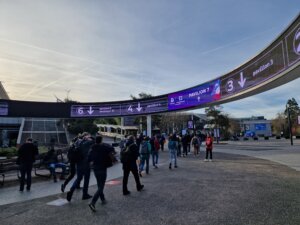
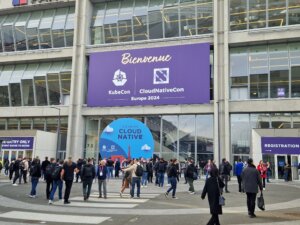
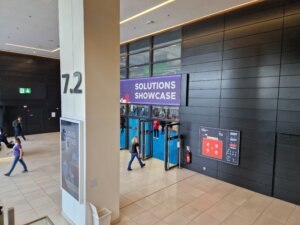
Anyone wishing to enter the conference first had to pass through security, consisting of metal detectors and possible bag checks.
Unfortunately, there was again the problem of overcrowded rooms this year. Several times during the day it was necessary to reschedule spontaneously, as the selected talk was unfortunately already overcrowded and admission was no longer possible. Unfortunately, this also applied to some keynotes in the morning.
A few impressions
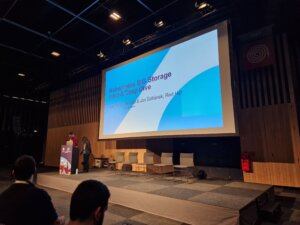
The CNCF Storage TAG and the Storage SIG reported on current developments in the storage sector and mentioned various white papers (“CNCF Storage Whitepaper, Performance and Benchmarking whitepaper, Cloud Native Disaster Recovery whitepaper, and the Data on Kubernetes whitepaper.”). Among other things, it was shown how “PersistendVolumeAttributes” can be used to adjust PersistentVolume attributes, for example to adjust the number of IOPS for a volume during operation.
In the Contribfest slot on Metal3 (Metal Kubed), the maintainers of the project gave a first insight and showed how a development environment can be set up. Among other things, Metal3 offers a ClusterAPI (CAPI) implementation that can be used to manage bare-metal systems. Ironic, which originates from the OpenStack project, is used in the background.
At the “From UI to Storage” talk Thanos maintainers gave an insight into the current implementation and potential future improvements.
In the “CRI-O Odyssey”, the CRI-O maintainers talked about innovations within the Container Runtime. This included the topic of “Confidential Containers” and “Podman-in-Kubernetes”. The topic of WASM integration was also on the agenda.
The maintainers of Fink reported on “Fink on Kubernetes” and how the system is used to classify objects like astroids or supernovas in the field of astronomy.
In the talk “eBPF: Abilities and Limitations”, not only general misconceptions were clarified, but also ways to work around existing limitations were pointed out. In addition, the question of whether eBPF touring is complete was raised and a version of Conway’s “Game of Life” in eBPF was presented.
Those who have always wanted to know how Istio mTLS can be implemented in multi-cluster environments with the help of SPIRE found what they were looking for in room D. After a short introduction to SPIFFE and SPIRE, it was shown how Istio components can be connected to the SPIRE agent.
Maintainers of operator-sdk talked about current innovations in operator-SDK and OLM V1. Particularly interesting were the changes in the Operator Lifecycle Manger that have been introduced in version 1 (previously version 0). Among other things, OLM v1 is now able to manage packaged operators via Helm, even without prior preparation by the operator maintainers.
Conclusion
In addition to many interesting talks, there were plenty of opportunities for lively discussions with other conference attendees and exchanges with exhibitors or project maintainers.
We are already looking forward to KubeCon 2025 in London!
This year’s FOSS Backstage took place on 2024-03-04 and 2024-03-05 at bUm in Berlin, Germany. One Debian Developer and employee of NetApp had the opportunity to attend this conference: Bastian Blank.
FOSS Backstage focuses on the non-coding aspects of Open Source projects. Aspects like governance, how to structure a project, and how to grow your project where talked a lot about. But also legal aspects on licenses choice and license compliance showed up.
Many startups will eventually show up the radar of Venture Capital. While this will make some people wealthy, this is often a turning point for FOSS principles. Melanie Rieback presented the keynote with insight into her successful non-profit security company. A company that can’t be sold to anyone really.
Once in a while, hopefully not too often, it will be necessary to change the structure of a project. For example if the founder of the project and his company suddenly goes away. Ruth Cheesley showed how changing the governance model can work in reality.
Funding is a not so easy, but still important part of every project. Some insights where given by Shane Curcuru about how projects are currently funded, with data he collects and publishes.
All presentations have been recorded and should show up on the YouTube channel of the organizers.
Introduction
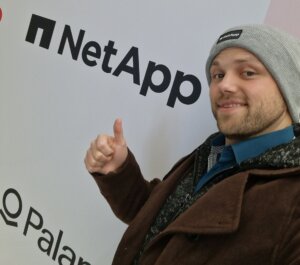
For the first time ever, one of our colleagues had the chance to visit the North American edition of KubeCon and CloudNativeCon in Chicago this year.
Our colleague Michael Sprengel who already works 8 years for credativ and has gained a lot of experiences with Kubernetes and the development of Kubernetes controllers in that time, is sharing his experiences from KubeCon and CloudNativeCon North America 2023.
So with no further ado, let’s hand it over to our colleague Michael.
Come fly with me back to Chicago
Hi folks, my name is Michael Sprengel – Professional Service Consultant here at credativ – and I want to share my experiences with you from this year’s KubeCon / CloudNativeCon in North America. So come with me and let me give you a first person view of all the talks and things that I was able to experience here in Chicago. You may not had the chance to visit the North American edition of KubeCon so far, so this is the best chance for you to get some insights which could make you think of also attending KubeCon and CloudNativeCon next year then.
Those editions will take place in Paris and Salt Lake City.
Chicago – The Windy City
The good thing about such conferences is not only the possibility to attend talks and learn about new technologies that you can use in daily projects but it’s also an opportunity to learn new cultures and leave with a bag full of new memories.
This year, the conference took place in Chicago that is also known as the Windy City. I was lucky enough to arrive on Saturday, so that I had a chance to pack my backpack and pay Chicago a visit a day before the conference started. Hereby, I was able to check some of Chicago’s well known sights like for example Lake Michigan or the mighty Millennium Park in the center of Downtown Chicago.
The only downfall to this was that Chicago’s Cloud Gate that is also known as The Bean. This landmark is currently under construction at, so that I could only take a picture through some construction fences. But other than that, the city has a lot to offer like Deep Dish and Thin Crust Pizza or some university you may want to visit. Chicago is definitely worth it.
Day 1: Operator Day
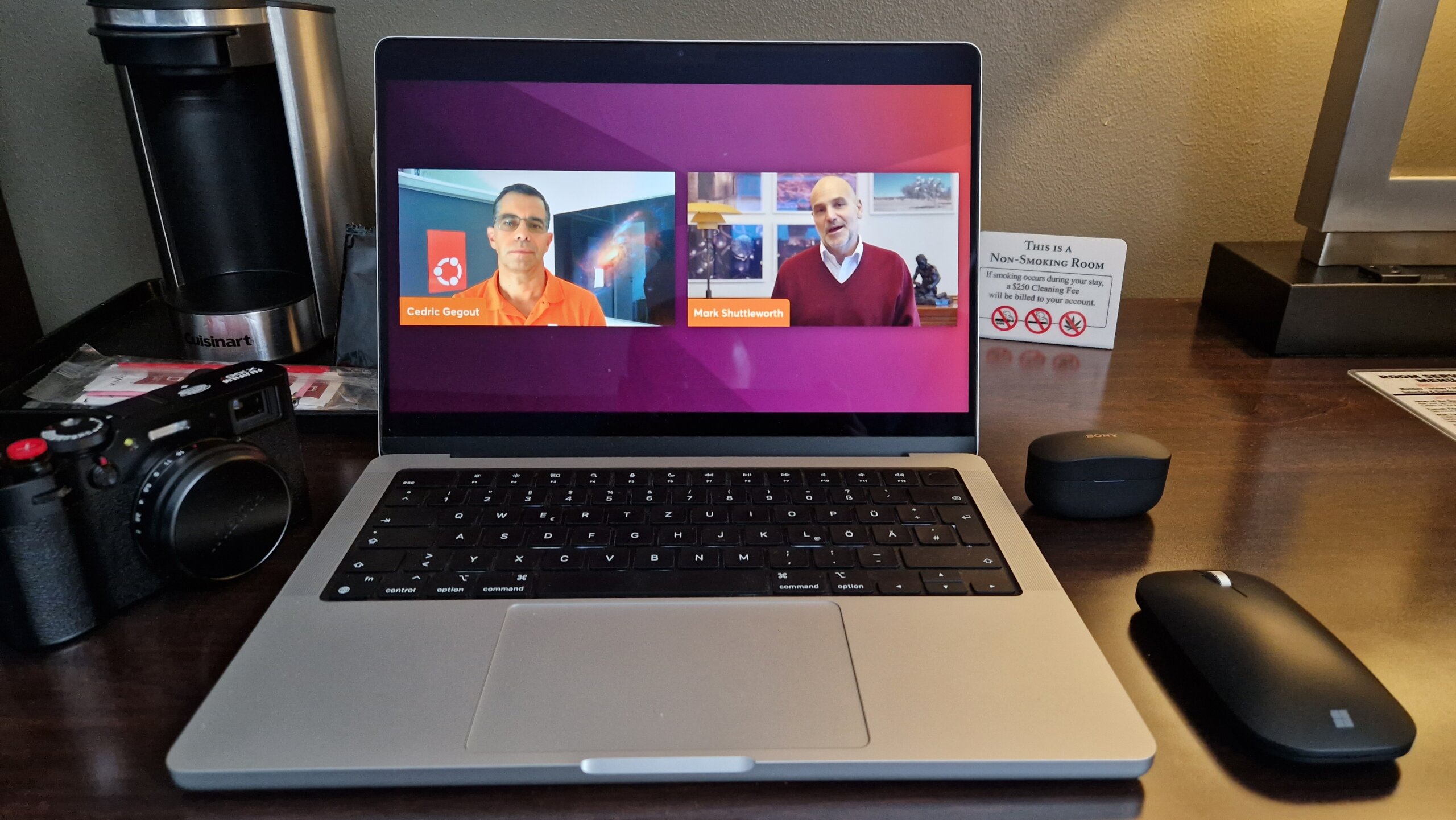
Besides of this wonderful city, the actual conference has also a lot to offer. If you’re lucky enough to get a All-access pass for KubeCon, you can already visit some CNCF-hosted Co-located events near the venue. But don’t worry. Even if you don’t have such a pass, you can attend some virtual events already.
For me personally, I attended the so called Operator Day by Canonical. It’s a full day event that takes place from 9am to 4pm. It gave me some pretty good insights in implementing Kubernetes operators the Canonical way by using Juju.
Unfortunately, the current edition from Chicago isn’t online so far, but you can check out the last Operator Day from Europe by watching the videos below:
You are currently viewing a placeholder content from Default. To access the actual content, click the button below. Please note that doing so will share data with third-party providers.
Day 2: First experiences from the venue
The second day was really mind blowing. If you never attended such a conference before, you will be surprised by the amount of talks as well as by the size of the actual venue.
After arriving at the venue, I had a chance to grab a breakfast and a coffee as well as attend the Opening Remarks in which leading Kubernetes and CNCF developers, engineers and ambassadors highlight the latest and greatest changes in Kubernetes and the CNCF space. Here, you could really feel how Machine Learning and AI is influencing Kubernetes and how features are added to this project to better support ML/AI.
Next to this, you have a big variety of talks that you can attend or you can go to the Solutions Showcase where all the major companies and sponsors have their booth. There, you can talk to maintainers or get in touch with companies that are using CNCF related projects or Kubernetes in their business. Typically some booths also offer so called Lightning Talks. These are like general talks but they tend to be shorter than the usual ones and they are mostly focusing on hands on sessions or live demos.
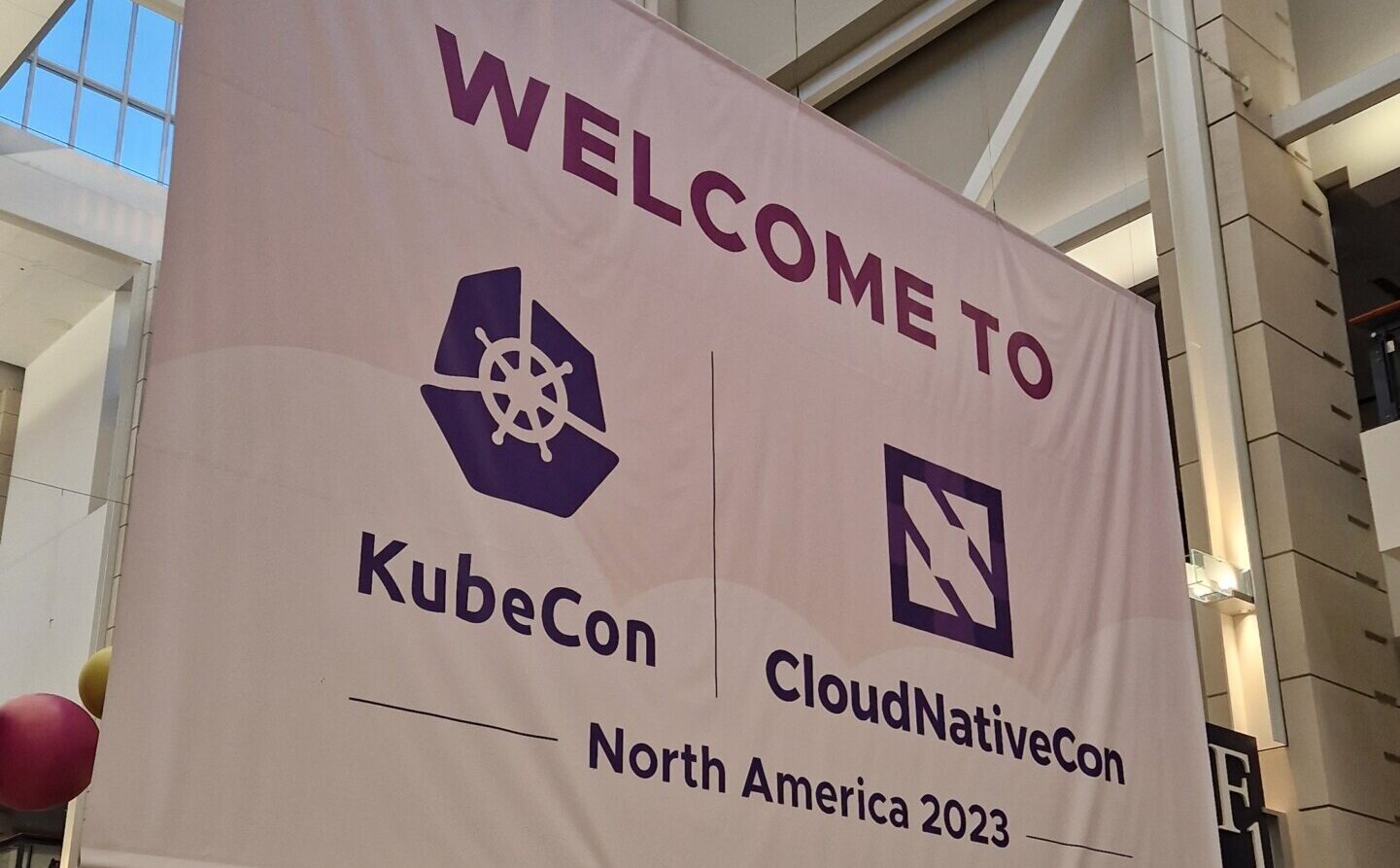
Day 3/4: Talks, talks and some more talks
In general, I was able to attend a lot of talks during the conference. Some of them were exactly what I was expecting and others however surprised me. Thereby, I visited the following talks:
Day 1
- 15,000 Minecraft Players Vs One K8s Cluster. Who Wins? – Justin Head, Super League Gaming; Cornelia Davis, Spectro Cloud
- It’s Never Too Late for PKI – Fundamentals: Building a Mental Model – Jacki Elliott, Microsoft
- High Performance, Low Latency Networking for Edge & Telco – Nupur Jain, Intel; Ian Coolidge, Google
- Take it to the Edge: Creating a Globally Distributed Ingress with Istio & K8gb – Jimmy Dyson, D2iQ
- Building Better Controllers – John Howard, Google
- Service Mesh Battle Scars: Techology, Timing and Tradeoffs – Lin Sun, solo.io; John Howard, Google; Thomas Graf, Isovalent; Flynn, Buoyant; Keith Mattix, Microsoft
Day 2
- Apply the Can Opener of Enlightenment: Lifting the Lid off Kubernetes Networking – Joe Thompson, HashiCorp
- Everything Is Code: Embracing GitOps at Spotify – Tim Hansen, Spotify
- Learning Kubernetes by Chaos – Breaking a Kuberntes Cluster to Understand the Components – Ricardo Katz, VMWare; Anderson Duboc, Google Cloud
- TikTok’s Global Service Accelerator – Vikram Si Siwach, TikTok/Bytedance
- Modern Load Balancing, Improving Application’s Resource Availability and Performance – Antonio Ojea, Google; Gerrit DeWitt, Google
- Istio: The Past, Present and Future of the Project and Community – Louis Ryan, solo.io; John Howard, Google
Day 3
- Insights and Gotchas from the Zero-Downtime Migration of 10000+ Cloud Hosted Etcd Key-Value Stores – Prabhakar Palanivel, Oracle Corporation
- Sidecar Containers Are Built-in to Kubernetes: What, How, and Why Now? – Todd Neal, Amazon; Sergey Kanzhelev, Google
- Cilium: From Service Mesh to Kubernetes and Beyond with eBPF – James McShane, SuperOrbital; Hmanth Malla, Datadog; Liz Rice, Isovalent; Thomas Graf, Isovalent
- Automate Production-Ready Cluster Using Crossplane Compositions and Kyverno – Dolis Sharma, Nirmata
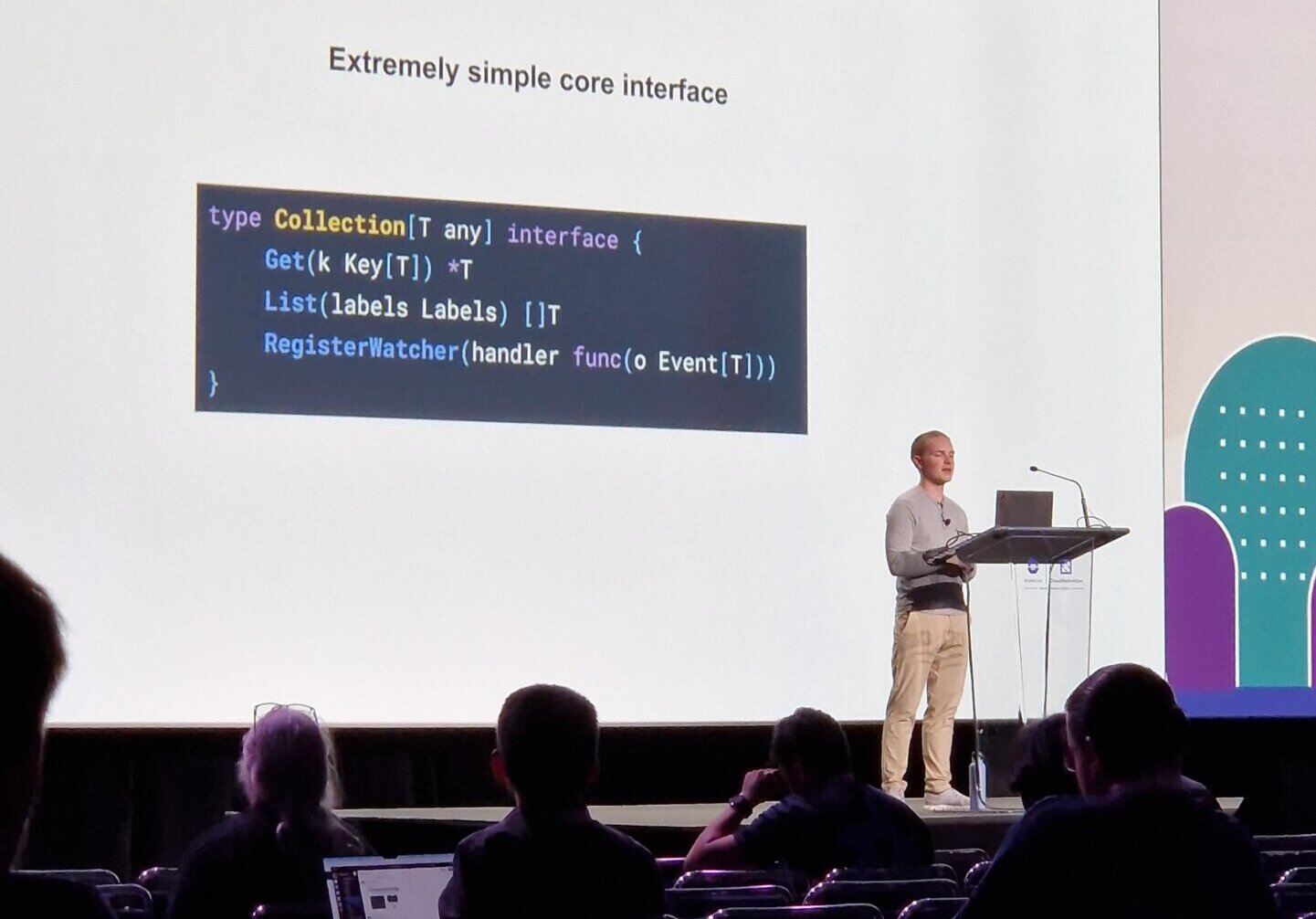
The Service Mesh Battle Scars talk was one of the talks that surprised me, because it was basically and public battle between the maintainers of the biggest Service Mesh solutions in Kubernetes.
- Cilium
- Istio
- linkerd
It surprised me because it was quite interesting to see how each of those projects were arguing differently to specific topics like transport encryption as well as Sidecar, Sideless or Ambient mode. As an attendee, you could really get a feeling of what thoughts each project put into specific topics before realizing them. Especially the topic about encryption caught my attention. Istio and linkerd simply use mTLS for encryption, whereas Cilium now tries to use TLS for the initial handshake while using the resulting encryption key for IPSec to implement transport encryption. This concept led to a heavy discussion if this approach is still considered to be secure since Cilium is only reusing some part of TLS instead of using it completely and usually reusing well known and accepted security algorithms is always preferred in modern IT.
Next to this, it was also pleasing to attend the Spotify talk in which Tim Hansen explained how the engineers at Spotify implement GitOps and what effort it takes to create a new project / repository that should be deployed on production. Spotify uses some self-written solutions to achieve this and overcome some limitation that already existing solutions might have. For building and deploying for example, Spotify uses their own CI/CD solution Tingle. Tingle was created in 2017 to serve as the centralized CI/CD system for backend, data and web services and it thereby replaced 200 stand-alone Jenkins machines. More information about this, can be found here:
You are currently viewing a placeholder content from Default. To access the actual content, click the button below. Please note that doing so will share data with third-party providers.
Although this talk mainly focused on Spotify and their GitOps tools, the presenter also showcased open source tools which helps to accomplish similar functionality without relying on Spotify’s own tools.
Overall, the majority of talks really helped me to broaden my knowledge regarding Kubernetes and the solutions out there. Only some talks didn’t match my expectation, but even then you still have plenty of other talks to choose from.
Get the first person view
If you want to get an idea of how such a conference looks like, I create three videos which let you experience the conference similar to what I was able to experience. Give it a try and visit KubeCon and CloudNativeCon 2023 with me again!
Conclusion
Having the opportunity to travel to Chicago and experience KubeCon and CloudNativeCon for the first time was an one in the lifetime experiences. You not only have the chance to get insights to so many CNCF related projects but it’s also a good opportunity to get in touch with developers, engineers, managers and other people who use Kubernetes on daily basis. If you have the chance to visit such a conference, I would highly recommend to take the chance and attend them.
On KubeCon and CloudNativeCon, I learned a lot about new stuff and got an idea of design decision that probably will help me to solve some upcoming challenges in one of my own projects and which I wouldn’t know about if I hadn’t attended this conference. Thereby, one quote from Dr. Angel Diaz, VP Technology Capabilities & Innovation at Discover Financial Services really stick to my head:
Code, Community, Culture
And this is what it’s all about. You not only learn new stuff that you can use in your code, but you become a part of a community and get use to a culture which enables you to contribute to projects that are the baseline of most of our daily projects.
With a lot of Deep Dish Pizza in my stomach and a lot of new knowledge in my head, I’m happy to return from KubeCon North America and start working on my Kubernetes projects again.
Thanks for sticking around with me and I hope to see you on next year’s KubeCon and CloudNativeCon, too.
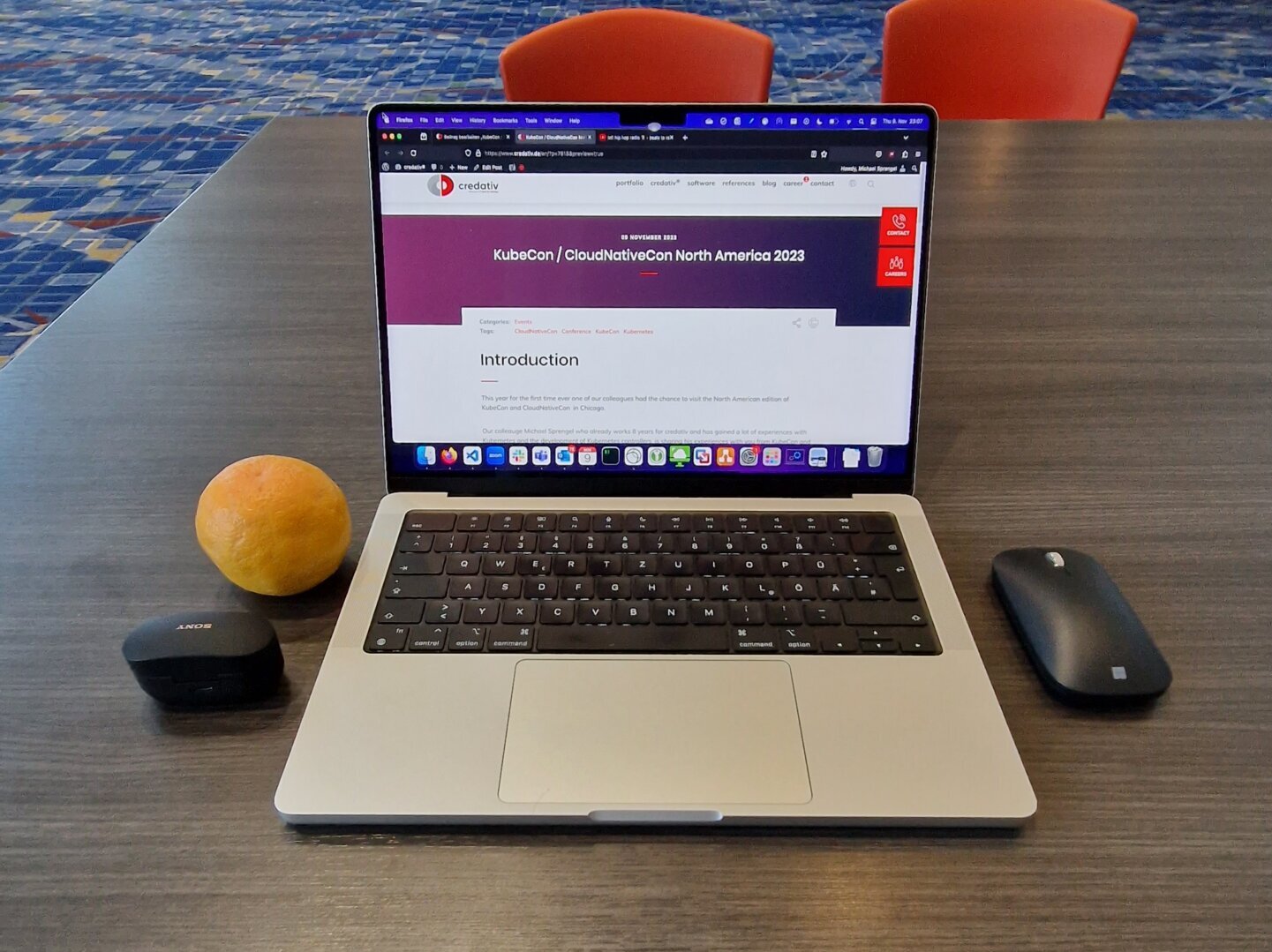
And by the way, if you’re searching for experts in Kubernetes and CNCF related topics, give our sales department a call and we might be able to help you with that.
This years All Systems Go! took place on 2023-09-13 and 2023-09-14 at the nice location of Neue Mälzerei in Berlin, Germany. One Debian Developer and employee of NetApp had the opportunity to attend this conference: Bastian Blank.
All Systems Go! focuses on low-level user-space for Linux systems. Everything that is above the kernel, but is so fundamental that systems won’t work without.
A lot of talks happened, ranging from how to use TPM with Linux for measured boot, how to overcome another Y2038 problem, up to just how to actually boot fast. Videos for all talks are kindly provided by the nice people of the C3VOC.
DebConf23 https://debconf23.debconf.org/ took place from 2023-09-10 to –17 in Kochi, India.
Four employees (three Debian developers) from NetApp had the opportunity to participate in the annual event, which is the most important conference in the Debian world: Christoph Senkel, Andrew Lee, Michael Banck and Noël Köthe.
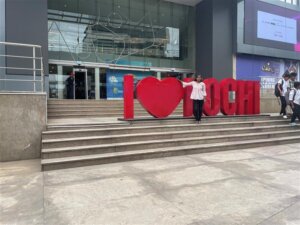
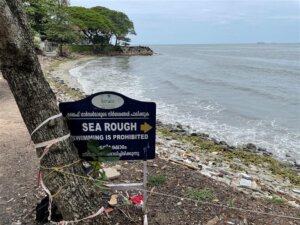
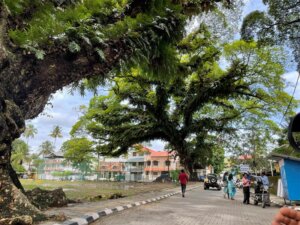
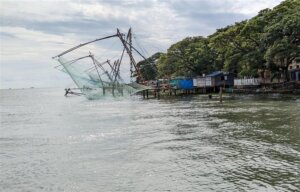
DebCamp
What is DebCamp? DebCamp usually takes place a week before DebConf begins. For participants, DebCamp is a hacking session that takes place just before DebConf. It’s a week dedicated to Debian contributors focusing on their Debian-related projects, tasks, or problems without interruptions.
DebCamps are largely self-organized since it’s a time for people to work. Some prefer to work individually, while others participate in or organize sprints. Both approaches are encouraged, although it’s recommended to plan your DebCamp week in advance.
During this DebCamp, there are the following public sprints:
- Debian Boot Camp: An introduction for newcomers on how to contribute to Debian more deeply.
- GPG keys 101: Get your keys ready for DebConf’s key signing party: An introduction to PGP/GPG keys and the web of trust, primarily targeting those new to Debian who don’t have a GPG key yet.
In addition to the organizational part, our colleague Andrew also attended and arranged private sprints during DebCamp:
- Debian Installer hacking: Debian installer is a complex project with multiple components. We had an on-site d-i hacker, Alper Nebi Yasak, who guided us in addressing issues specific to zh_TW locale users in the Debian installer.
- LXQt/LXDE hacking session: LXQt and LXDE are lightweight desktop environments for Linux users. Our colleague Andrew Lee leads the LXQt team in Debian and also provided assistance to the LXDE team in the absence of their original team leader from Ukraine.
It also allows the DebConf committee to work together with the local team to prepare additional details for the conference. During DebCamp, the organization team typically handles the following tasks:
- Setting up the Frontdesk: This involves providing conference badges (with maps and additional information) and distributing SWAG such as food vouchers, conference t-shirts, and sponsor gifts.
- Setting up the network: This includes configuring the network in conference rooms, hack labs, and video team equipment for live streaming during the event.
- Accommodation arrangements: Assigning rooms for participants to check in to on-site accommodations.
- Food arrangements: Catering to various dietary requirements, including regular, vegetarian, vegan, halal, gluten-free (regular, vegetarian, vegan), and accommodating special religious and allergy-related needs.
- Setting up a conference bar: Providing a relaxed environment for participants to socialize and get to know each other.
- Writing daily announcements: Keeping participants informed about ongoing activities.
- Organizing day trip options.
- Arranging parties.
Conference talks
The conference itself started on Sunday 10. September with an opening, some organizational stuff, GPG keysigning information (the fingerprint was printed on the badge) and a big welcome to everyone onsite and in the world.
Most talks of DebConf were live streamed and are available in the video archive. The topics were broad from very technical (e.g., “What’s new in the Linux kernel”) over organizational (e.g., “DebConf committee”) to social (e.g., “Adulting”).
Schedule: https://debconf23.debconf.org/schedule/
Videos: https://meetings-archive.debian.net/pub/debian-meetings/2023/DebConf23/
Thanks a lot, to the voluntarily organized video team for this video transmission coverage.
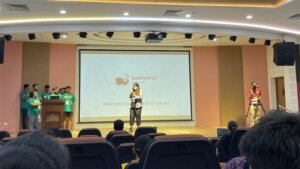
Lightning Talks
On the last day of DebConf, the traditional lightning talks were held. One talk in particular was noticed, the presentation of extrepo by Wouter Verhelst. At NetApp, we use bookworm-based Debian ThinkPad’s. However, in a corporate environment, non-packaged software needs to be used from time to time, and extrepo is a very elegant way to solve this problem by providing, maintaining and keeping UpToDate a list of 3rd-party APT repositories like Slack or Docker Desktop.
Sadya
On Tuesday, an incredibly special lunch was offered at DebConf: a traditional Kerala vegetarian banquet (Sadya in Maralayam), which is served on a banana leaf and eaten by hand. It was quite unusual for the European part of the attendees at first, but a wonderful experience once one got into it.

Daytrip
On Wednesday, the Daytrip happened and everybody could choose out of five different trips: https://wiki.debian.org/DebConf/23/DayTrip
The houseboat trip was a bus tour to Alappuzha about 60 km away from the conference venue. It was interesting to see (and hear) the typical bus, car, motorbike and Tuktuk road traffic in action. During the boat trip the participants socialized and visited the local landscape outside the city.
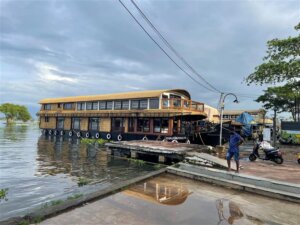
Unfortunately, we had an accident at one of the daytrip options. Abraham a local Indian participant drowned while swimming.
https://debconf23.debconf.org/news/2023-09-14-mourning-abraham/
It was a big shock for everybody and all events including the traditional formal dinner were cancelled for Thursday. The funeral with the family was on Friday morning and DebConf people had the opportunity with organized buses to participate and say goodbye.
NetApp internal dinner on Friday
The NetApp team at DebConf wanted to take the chance to go to a local restaurant (“were the locals go eating”) and enjoyed very tasty food.


DebConf24
Sunday was the last day of DebConf23. As usual, the upcoming DebConf24 was very briefly presented and there was a call for bids for DebConf25.
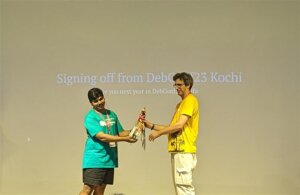
Maybe see you in Haifa, Israel next year.
https://www.debconf.org/goals.shtml
Authors: Andrew Lee, Michael Banck and Noël Köthe
Open Source Summit is the world’s largest, all-encompassing open source conference. Topics such as the latest infrastructure software, development on the Linux kernel and current works in open source communities are discussed. Until now, open source databases were a missing part of the conference program.
However, databases such as PostgreSQL® or Apache Cassandra are one of the most important pillars in modern open source infrastructures.
Together with the Linux Foundation, we are pleased to announce that this year’s Open Source Summit North America and Europe each will have their own database track.
Together with Sunil Kamath (Microsoft) and Divya Bhargov (Pivotal), our Managing Director Dr. Michael Meskes forms the program committee for the new track of the event.
Dr. Michael Meskes comments this in his blog post at the Linux Foundation as follows:
“The open source database track will feature topics specific to databases themselves and their integration to the computing backbone for applications. The track will focus on databases of all kinds, as long as they are open source, and any deployment and integration topics.”
The complete blog post of the Linux Foundation can be found here.
The Linux Foundation and the program committee are looking forward to plenty of submissions for this track. Presentations can be submitted until 16 February (North America) and 14 June (Europe).
This year’s Open Source Summit North America will take place in Austin, Texas. Whereas the Open Source Summit Europe will be hosted in Dublin, Ireland. Both events are once again backed by credativ with a sponsorship.
This article was originally written by Philip Haas.
From mid to late June credativ attended 3 consecutive conferences in Asia. The Open Source Summit Japan, the LC3 China and the PG Open China.
Open Source Summit Japan
As in the previous year, the Open Source Summit Japan was held again at the Ariake Conference Center on Odaiba, in the Bay of Tokyo. In order to cover the increasing number of participants, the event area was extended by several rooms. Accordingly, there was plenty of space for everyone.
In addition to a large number of technical presentations, mainly on containers, cloud and applications for automotive, there were also business and strategy orientated talks. All visitors could find topics of interest for themselves.
Specifically the presentation “Is There an Open Source Business Model: YES or NO?” by Jeffrey Borek (IBM) and Stephen Walli (Microsoft), deserves special mention, as it was the starting point for extensive discussions that day. Jeffrey and Stephen each gave their views and then gave the floor to the attendees to mix ask questions or give comments. The title being worded as it is doesn’t really explain the topic in detail. What the talk really was about is the question if a Open Source business model exists for large software companies.
Further to be emphasized is the presentation by our CEO Dr. Michael Meskes, whose question ”Is There a Future for Open SourceLC3 China LC3 China (LinuxCon + ContainerCon + CloudOpen) was held in Beijing at the China National Convention Center. In the immediate vicinity of the Olympic Green Olympia Park, which was built for the 2008 Olympic Games. Most of the presentations were held in English, although the vast majority of those attending were from China. A very welcoming gesture that definitely contributed to the international character. A large number of lectures with technical and business topics were held over the 4 days. Particularly interesting were the so called “office hours” as a separate position on the schedule. For this, 3 tables were provided at which discussions within the community could take place. On the whole, LC3 seemed to be a platform for China’s largest IT companies, but it also showed that hacker groups and student groups have their own place in the community. We were certainly very happy to be able to participate and are looking forward to the next year. Postgres’ growing success and the well-attended PostgreSQL® conferences, which have been held in China since 2015, led to the first PG Open China being held at the Hotel Nikko New Century Beijing this year. The aim of this conference was to provide a starting point for the Chinese PostgreSQL community and strenghthen its connection to the global PostgreSQL community . For or this purpose, an international committee was established consisting of Bruce Momjian, Joshua D. Drake, Oleg Bartunov, Ray Feng and Dr. Michael Meskes. After introducing this committee in a keynote, the event rooms were used for presentations and talks from the Chinese community. Joshua D. Drake and Oleg Bartunov also held a presentation. All lectures were translated with the help of an interpreter, so that all those present with less understanding of the English language nuances could comprehend everything. The number of visitors of the PG Open China fortunately exceeded expectations and as such that the growth potential can clearly be seen. Especially with the focus on connection to the international community, the conference will certainly grow significantly over the next few years. It is therefore highly probable that we will be back on site next year. We were very happy to be one of the fist to participate in the PG Open China.PG Open China

